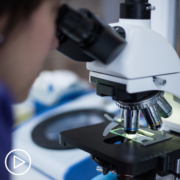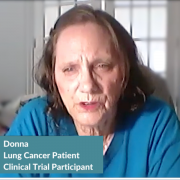What Steps Can BIPOC Lung Cancer Patients Take to Guard Against Care Disparities?
What Steps Can BIPOC Lung Cancer Patients Take to Guard Against Care Disparities? from Patient Empowerment Network on Vimeo.
How can BIPOC lung cancer patients or other underrepresented patients help guard against care disparities? Expert Dr. Lecia Sequist shares advice for non-small cell lung cancer (NSCLC) patients to help ensure they receive optimal treatment with the most advanced treatments available.
Dr. Sequist is program director of Cancer Early Detection & Diagnostics at Massachusetts General Hospital and also The Landry Family Professor of Medicine at Harvard Medical School.
[ACT]IVATION TIP:
“You don’t have to ask permission to get a second opinion, you can just make an appointment with a different oncologist or go to an oncologist if you haven’t seen one before. Because lung cancer is changing and treatments are more successful, and we all have to do more as a community to make sure that those treatments are offered to everyone.”
Download Resource Guide en español
See More from [ACT]IVATED NSCLC
Related Resources:
Transcript:
Lisa Hatfield:
So, Dr. Sequist, we know that there are significant disparities in the treatment and the outcomes of minority patients who have non-small cell lung cancer. How can patients avoid these discrepancies in the timeliness of their diagnosis, because that can be an important factor in their outcome?
Dr. Lecia Sequist:
Yeah. I think lung cancer has changed a lot, but in the last 10 years, and there are better treatments than there used to be, and there’s a lot more treatments than there used to be, but not all doctors are aware of these new developments. And I think some doctors still have a kind of an old-fashioned nihilistic view about lung cancer, which can be very negative, which is that lung cancer can’t be treated effectively and patients are just going to do very poorly. That’s not true anymore. It may have been true 20, 30 years ago, unfortunately. But with treatments today, lung cancer patients can live longer, be cured more often and have better quality of life than with some of the older treatments.
And I think in the ideal world, the responsibility really should be on the physicians to make sure that they’re offering those treatments to patients, but in the real world, that doesn’t always happen. And so I think something that patients can do to empower themselves is also to ask their physicians if there’s anything else that can be done or if they should see a second opinion. If you’re feeling like your doctor is not offering you really many options or is being kind of nihilistic, having a very negative picture of what might happen to you with your cancer, then I would just get a second opinion. You don’t have to ask permission to get a second opinion, you can just make an appointment with a different oncologist or go to an oncologist if you haven’t seen one before. Because lung cancer is changing and treatments are more successful, and we all have to do more as a community to make sure that those treatments are offered to everyone. But until that day comes, I think patients also need to feel empowered to ask for other treatments and other opinions.





![[ACT]IVATED Program Logo [ACT]IVATED Program Logo](https://powerfulpatients.org/wp-content/uploads/Program-page-image-option-1-180x180.png)






